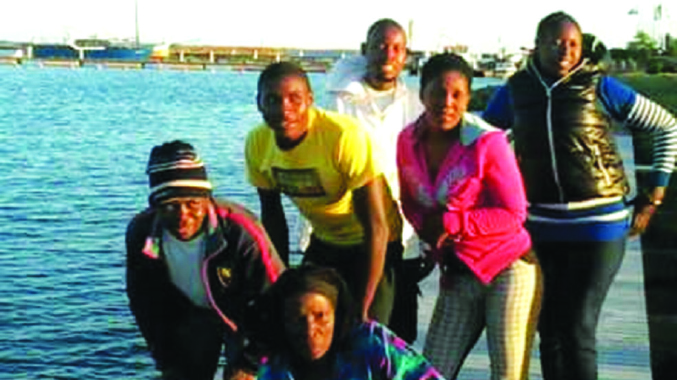Group out to promote cultural tourism

Fungai Lupande Mash Central Bureau
Swerengoma Arts Production, a locally-based theatre and traditional dance outfit, is preserving unique and distinct traditional dances from different parts of the country to promote cultural tourism.
Speaking after a sterling performance at the World Tourism Day commemorations last Saturday in Bindura, Swerengoma proprietor William Majuru said dance was an important part of a people’s culture and defines who they are.
Although Covid-19 had cast a dark cloud over the arts industry, the outfit found a silver lining and registered Children in the Arts Initiative World, an arts academy with the National Arts Council to scout for young talent in schools.
“We want to impart the knowledge we have to the youngsters. We want to teach young children how to play and carve traditional music instruments like shakers (hosho) and marimba. What we are lacking are district cultural centres and people with talent don’t have places for rehearsal,” said Majuru.
The group, which benefited from Covid-19 relief funds, is thankful to First Lady Auxillia Mnangagwa for recognising Majuru as a living legend among five others from Mashonaland Central.
Reliving some of their best moments in the arts industry, Majuru a multi-award winner, said it was his first trip to Europe where they ended up in Turkey instead of Tallinn, Estonia.
The bad omen started during preparation for the journey in 2015 when they failed to raise funds to travel to OR Tambo Airport in South Africa since the trip was sponsored thereafter.
A day before the trip, they spent the night in the prayer mountain in Bindura seeking divine intervention.
Production manager Sydney Chataiwa who accompanied Majuru to the interview said after the prayer session he went into town clueless and met Kenneth Musanhi.
He had written a letter requesting assistance to his office as well as other offices and he said he never saw the letter.
Chataiwa said the country they sought to visit was far away on the North Pole and not many people in the country have ever been there.
He gave them bus fare to South Africa and they went back to the prayer mountain as they got ready for the longest journey of their lives.
“We fumigated our traditional instruments and we were late for the last cheap bus we could afford to get to South Africa. The bad omen followed us to Beitbridge Border Post where the immigration officer said the face on the passport bore no resemblance to me,” said Chataiwa.
“I had to produce all my documentation to have my passport stamped. One of our band members was accused of using a fake stamp on her passport at the South Africa side and we had to give them R200 to pass.”
However, they arrived in time for their flight. For the whole band, except for Majuru, it was their first time to board a flight. Narrating the experience, Chataiwa said it seemed like a dream.
“I didn’t notice the plane taking off, I only saw on the screen that we were flying over Harare via Mozambique, then out of Africa. The plane landed in Turkey, Istanbul and the bad omen kept following us.”
“We were directed to take a plane anticipating that we were proceeding to Estonia Tallinn, and then we realised we were in Finland. We were failing to communicate with our sponsors. We were subjected to thorough searching in Finland.
“Our snuff and traditional instruments were scanned and tested. Our bodies were scanned and we could see our intestines on the computer. We spent the night on the benches on empty stomachs.
“We were all over the news that we were lost and everyone was looking for us. We were only given food at around 8am the following day and the four ladies who were travelling with us had not bathed.”
They were accompanied to another plane at around 10am and upon arrival in Tallinn, scores of journalists were waiting for them.
Majuru was asked to attend interviews while the rest of the group went to a hotel to rest and freshen up.
“On our way to the hotel we were given a grand escort with cars and motorcycles, we almost forgot the trouble we had been through,” said Chataiwa.
“After a short rest we were requested to perform. Our debut performance we asked the audience to kneel down as we paid tribute to our ancestral spirits. This was important for us because we were representing our culture in a foreign land.
“We gave a sterling performance and a Zimbabwean who was in the audience was mesmerised. He followed us to our next performance. We were later escorted to State House in Tallinn and met the country’s president.”
They realised that they were performing at a World Orient Dance Festival where China was the winner over years. They performed at the State House and their performance marked the official opening.
“There was a deafening silence as we performed Zimbabwean dances. Afterward the audience erupted in applause and the president stood up and declared that we had won. We carried a small flag and it was raised while we sang the national anthem,” he said.
“We were scheduled to have an annual visit until this year, but Covid-19 has restricted our movement. We came back content that we had represented our country. We applied for land to start a theatre centre and we were granted over 10 500 square metres at US$96 000 that we are failing to pay.”
“We faced challenges in society as people thought we came back with lots of money and we started counselling each other on how to cope.
“People said awful things about us, including that we were used, and this brought us together as a group.
“I came back with an electric guitar and a few dollars. My brother chided that I travelled all the way to Europe for a guitar which I could buy in Harare. What I cherish most is the exposure and experience I obtained from the trip,” said Majuru.
Majuru said he was thankful to the Mashonaland Central Minister of State for Provincial Affairs and Devolution Senator Monica Mavhunga for sending him to Mash East to learn the Jerusarema dance which is a romantic, hunting and celebration dance.
The original name was “mbende” a type of bush rat which men would demonstrate how it walks to the family after hunting.
The group also performs an assortment of traditional dances from across the country and every dance has a meaning.
“A dance is a story telling process which has a beginning and an end. Dances are powerful tools in preserving our culture. While dancing, members fall into trance and are possessed with ancestral spirits of people who started the dances,” he said.
With a career spanning over 33 years, Majuru started with Ukubambana group in 1988 which disbanded in 1995 due to lack of sponsorship.
He revived the group in 1998 and renamed it Swerengoma Arts Productions and was awarded the best actor of the year in 1994. He visited several African countries and has won many accolades.









Comments